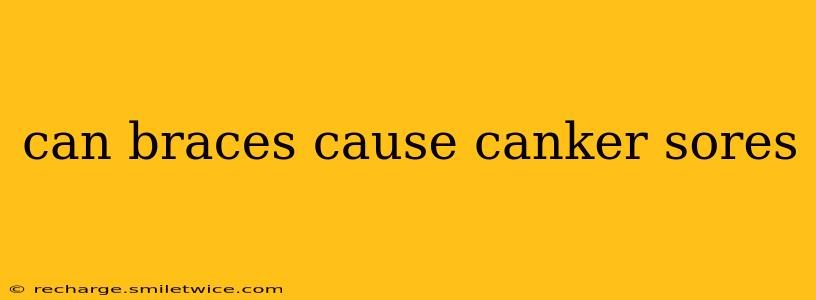Many orthodontic patients wonder if their braces could be the culprit behind those painful canker sores. While braces themselves don't directly cause canker sores, they certainly create an environment that can make them more likely to develop. This comprehensive guide will explore the connection between braces and canker sores, answering common questions and providing helpful advice.
What are Canker Sores?
Before diving into the connection with braces, let's understand what canker sores actually are. Canker sores, also known as aphthous ulcers, are small, shallow ulcers that develop inside the mouth. They're typically round or oval, and can range in size from tiny pinpricks to larger lesions. They're characterized by a whitish-yellow center surrounded by a reddish border. While annoying and painful, canker sores aren't contagious.
How Can Braces Contribute to Canker Sore Development?
Braces significantly increase the risk of developing canker sores due to several factors:
-
Irritation: The metal brackets and wires of braces can irritate the soft tissues of the mouth, creating tiny abrasions that provide entry points for bacteria or viruses. This constant rubbing can easily lead to inflammation and ulcer formation.
-
Food Trapping: The brackets and wires of braces create more nooks and crannies where food particles can get trapped. These trapped food particles can decay, leading to bacteria buildup and increased risk of infection, which can trigger canker sores.
-
Poor Oral Hygiene: It's more challenging to maintain impeccable oral hygiene with braces. If food debris isn't adequately removed, it can increase the risk of infection and inflammation, potentially resulting in canker sores.
-
Stress: The process of getting braces and undergoing orthodontic treatment can be stressful for some individuals. Stress is a known trigger for canker sores, making it another contributing factor.
Can Braces Directly Cause Canker Sores?
While braces don't directly cause canker sores in the sense that they're not the underlying cause of the condition, they significantly increase the likelihood of their appearance due to the factors mentioned above. The braces act as an irritant and create an environment conducive to the development of these painful sores.
What are the Symptoms of Canker Sores Related to Braces?
The symptoms of canker sores associated with braces are the same as those of regular canker sores. You'll experience:
- Pain: Varying degrees of pain, from mild discomfort to severe burning or throbbing.
- Burning Sensation: A burning sensation may precede the visible ulcer.
- White or Yellow Center: The ulcer typically has a white or yellowish center.
- Red Border: The ulcer is surrounded by a reddish border.
- Tenderness: The area around the ulcer may be tender to the touch.
How Can I Prevent Canker Sores with Braces?
Practicing diligent oral hygiene is crucial to minimize the risk of canker sores while wearing braces. Here's what you can do:
-
Meticulous Brushing and Flossing: Brush your teeth gently but thoroughly at least twice a day, using a soft-bristled toothbrush. Floss carefully around each bracket and wire, using a floss threader if necessary.
-
Mouthwash: Use a fluoride mouthwash to help kill bacteria and reduce inflammation. Some mouthwashes are specifically designed for sensitive mouths, making them ideal for patients with braces.
-
Gentle Diet: Avoid sharp, crunchy, or acidic foods that could irritate your gums or get stuck in your braces.
-
Regular Dental Checkups: Keep up with your regular checkups with your orthodontist and dentist.
-
Stress Management: Practice stress-reducing techniques like exercise, yoga, or meditation.
What Should I Do if I Develop Canker Sores While Wearing Braces?
If you develop canker sores, don't panic. Most canker sores will heal on their own within a week or two. However, you can take steps to relieve the discomfort:
- Over-the-counter pain relievers: Use pain relief gels or mouthwashes designed for canker sore relief.
- Saltwater rinses: Rinse your mouth with warm salt water several times a day to reduce inflammation.
- Avoid Irritants: Avoid acidic or spicy foods that could further irritate the sores.
- Contact your Dentist or Orthodontist: If your sores are severe, persistent, or don't heal, consult your dentist or orthodontist for advice. They may recommend a prescription medication.
By understanding the connection between braces and canker sores and by following these preventative measures, you can significantly reduce your risk of experiencing this common orthodontic side effect. Remember, maintaining excellent oral hygiene is your best defense.
